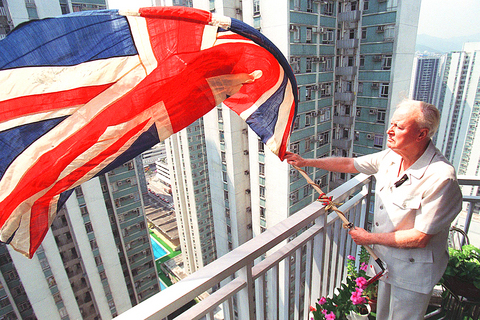Jack Edwards, a British World War II prisoner of war (POW) who dedicated his life to tracking down Japanese war criminals and defending the rights of veterans, has died at the age of 86.
Edwards, who spent four years in Japanese prisoner of war camps -- initially in Singapore's notorious Changi prison and then a camp in Chinguashi (
A spokeswoman for the Hong Kong and China branch of the Royal British Legion (RBL) said yesterday that Edwards had died in Prince of Wales hospital, a former British army treatment center, after battling the after-effects of a stroke suffered five years ago.

PHOTO: AFP
Doctors had yet to indicate the exact cause of death, she added.
The president of the legion branch, Brigadier Christopher Hammerbeck, hailed Edwards.
"The Hong Kong and China RBL deeply regret the passing of Jack Edwards, a man who made a major contribution to the legion and to the wellbeing of Hong Kong's war veterans and particularly their widows," Hammerbeck said.
"He was not only a leading figure locally but also internationally within the legion and the British Commonwealth Ex-Servicemen's League, whose conferences he attended until illness prevented him from doing so," he added.
Edwards' career as a soldier was cut short when he was captured by Japanese troops while defending Singapore in 1942 after serving in the doomed Battle of Malaya.
Taiwan camp
He won his freedom when US troops liberated Taiwan, then called Formosa, where he had been held as a slave laborer in the the Kinkaseki POW camp in the town of Chinguashi during the latter years of World War II.
Prisoners at the camp worked under brutal conditions at a copper mine. They endured malnutrition and were subject to frequent beatings by guards. Many died.
Edwards detailed the horrors of his time at the Kinkaseki camp in Chinguashi in his book, Banzai You Bastards.
Following a brief spell in his native Wales after the end of the war, he returned to Chinguashi in 1946, as part of a team that was investigating war crimes to help track down and prosecute Japanese war criminals.
Edwards returned to Taiwan several times, and in 1997 led a tour of the site of the camp and mine in Chinguashi. The success of the event helped lead to the establishment of an annual POW memorial event in Chinguashi.
Edwards never fought in Hong Kong but it was here that he made his greatest post-war achievements, most notably winning Hong Kong's war widows the right to British passports when the territory's sovereignty switched to China in 1997.
In recognition of his efforts, Edwards was informed of the decision in person by the then British prime minister John Major at Government House, which was the official residence of the colonial government.
Honors
Decorated with military and civilian Member of the British Empire honors, Edwards' efforts extended across the Asia-Pacific region, where he badgered governments for the establishment of shrines to fallen Allied soldiers.
The RBL is planning a commemoration for Edwards following a funeral at the Anglican cathedral in Hong Kong.

An essay competition jointly organized by a local writing society and a publisher affiliated with the Chinese Communist Party (CCP) might have contravened the Act Governing Relations Between the People of the Taiwan Area and the Mainland Area (臺灣地區與大陸地區人民關係條例), the Mainland Affairs Council (MAC) said on Thursday. “In this case, the partner organization is clearly an agency under the CCP’s Fujian Provincial Committee,” MAC Deputy Minister and spokesperson Liang Wen-chieh (梁文傑) said at a news briefing in Taipei. “It also involves bringing Taiwanese students to China with all-expenses-paid arrangements to attend award ceremonies and camps,” Liang said. Those two “characteristics” are typically sufficient

A magnitude 5.9 earthquake that struck about 33km off the coast of Hualien City was the "main shock" in a series of quakes in the area, with aftershocks expected over the next three days, the Central Weather Administration (CWA) said yesterday. Prior to the magnitude 5.9 quake shaking most of Taiwan at 6:53pm yesterday, six other earthquakes stronger than a magnitude of 4, starting with a magnitude 5.5 quake at 6:09pm, occurred in the area. CWA Seismological Center Director Wu Chien-fu (吳健富) confirmed that the quakes were all part of the same series and that the magnitude 5.5 temblor was

The brilliant blue waters, thick foliage and bucolic atmosphere on this seemingly idyllic archipelago deep in the Pacific Ocean belie the key role it now plays in a titanic geopolitical struggle. Palau is again on the front line as China, and the US and its allies prepare their forces in an intensifying contest for control over the Asia-Pacific region. The democratic nation of just 17,000 people hosts US-controlled airstrips and soon-to-be-completed radar installations that the US military describes as “critical” to monitoring vast swathes of water and airspace. It is also a key piece of the second island chain, a string of

The Central Weather Administration has issued a heat alert for southeastern Taiwan, warning of temperatures as high as 36°C today, while alerting some coastal areas of strong winds later in the day. Kaohsiung’s Neimen District (內門) and Pingtung County’s Neipu Township (內埔) are under an orange heat alert, which warns of temperatures as high as 36°C for three consecutive days, the CWA said, citing southwest winds. The heat would also extend to Tainan’s Nansi (楠西) and Yujing (玉井) districts, as well as Pingtung’s Gaoshu (高樹), Yanpu (鹽埔) and Majia (瑪家) townships, it said, forecasting highs of up to 36°C in those areas